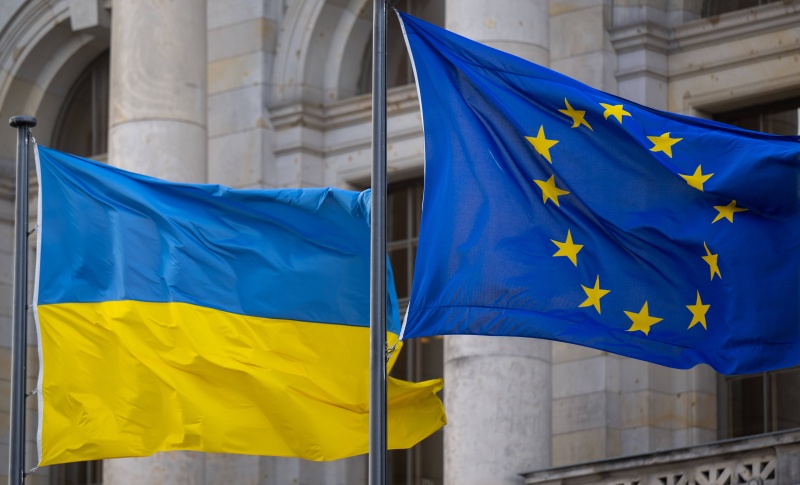The European Union is reportedly formulating a contingency strategy to extend financial support to Ukraine, currently facing Russian military aggression. According to the Financial Times, the EU is prepared to allocate 20 billion euros for Ukraine, even in the absence of approval from Hungary.

The flags of the European Union (first from the right) and Ukraine. Photo by Monika Skolimowska/PAP/DPA
In mid-December, the Prime Minister of Budapest, Viktor Orbán, officially announced that during the two-day European Union summit in Brussels, he was the sole EU leader to veto the adoption of a new financial support package for Ukraine amounting to 50 billion euros. "A veto against the new financial aid package for Ukraine, a veto against the MFF revision [European Multiannual Financial Framework – Ed. courier.plus]. We will revisit this issue next year after proper preparations," wrote the Hungarian Prime Minister on the X platform at that time.
According to EU officials, the backup plan currently being developed appears to be the most effective way to provide Ukraine with funds in the event that Viktor Orbán decides to repeat his veto at the planned EU summit on February 1.
The 'Financial Times' reported - citing unnamed officials involved in discussing the plan - that the EU plans to utilize a scheme similar to the one employed in 2020 when the European Commission allocated 100 billion euros to member states for combating the COVID-19 pandemic. According to the prestigious London-based newspaper, citing insiders involved in the discussions, the European Commission would raise funds for assistance to Kyiv by borrowing on capital markets.
Such a mechanism would allow bypassing the objections of Hungarian Prime Minister Viktor Orbán regarding EU funding for war-torn Ukraine, as the implementation of this program does not require the consent of all 27 EU member states. However, the Financial Times notes that not only a political decision from EU leaders but also the approval of national parliaments in countries such as Germany and the Netherlands may be necessary.
According to sources cited by the British newspaper, a drawback of the contingency aid plan compared to the original proposal based on the amended EU budget is that "the assistance would be limited to loans and would not include non-repayable grants." Nevertheless, the Financial Times emphasizes that EU member states can still decide to grant subsidies through bilateral agreements with Ukrainian authorities.
Portal Euroactiv.pl noted that since the outbreak of the full-scale war in Ukraine, the European Union and its member states have provided the authorities in Kyiv with "over 80 billion euros in support, including 31 billion euros for financial and budgetary assistance, as well as humanitarian aid, 24 billion euros for military support, and 17 billion euros for assistance to refugees."
The Polish Press Agency has highlighted the growing calls within the EU for the reactivation of the Article 7 procedure of the Treaty on European Union concerning the violation of the rule of law. This procedure could lead to the temporary suspension of Hungary's voting rights, and after a change in power in Poland, the government in Budapest might face challenges in finding an ally who would come to its defense.
(J)
